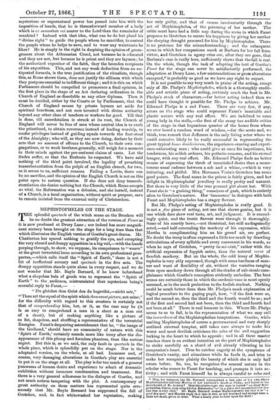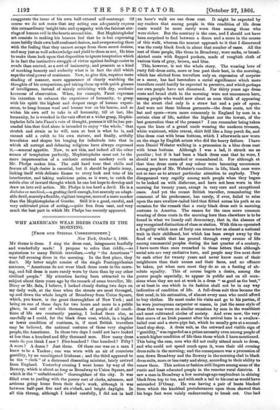MEPHISTOPHELES ON THE STAGE.
" Du gleichst dem Geist den du begreifst,—nicht mir,"
-" Thou art the equal of the spirit which thou cant picture, not mine;" for the difficulty with regard to this creature is certainly not that of comprehending him, her, or it, as the case may be (it is as easy to comprehend a man in a sheet as a man out of a sheet), but of making anything like a picture of so fat, shapeless, and shuffling a representative of the terrestrial Energies. Faust's despairing astonishment that he, "the image of the Godhead," should have no community of nature with this Spirit of Earth,' certainly sounds more like irony after the dis- appearance of this plump and formless phantom, than like serious regret. But this is, as we said, the only fault in spectacle in the whole piece, which is splendidly put on the stage. Nor is the adaptated version, on the whole, at all bad. Immense and, of course, very damaging. alterations in Goethe's play are essential to put it on the stage at all. The play is far too much of a general panorama of human desire and experience to admit of dramatic exhibition without immense condensation and treatment. But there is a very general adherence to the dialogue of Goethe, and not much serious tampering with the plot. A contemporary of great authority on these matters has represented quite erro- neously that Mr. Bayle Bernard has suppressed the fall of Gretchen, and, in fact whitewashed her reputation, making her only guilty, and that of course involuntarily through the act of Mephistopheles, of the poisoning of her mother. The critic must have had a little nap during the scene in which Faust proposes to Gretchen to secure his happiness by giving her mother the sleeping draught procured for him by Mephistopheles. There is no pretence for the misunderstanding ; and the subsequent scene in which her companions mock at Barbara for her fall from virtue, and Gretchen in agony cries out, after they are gone, that Barbara's case is really hers, sufficiently shows that the fall is real. On the whole, though the task of adapting the text of Goethe's Faust for the stage can never be satisfactorily performed, the adaptation at Drury Lane, a few mistranslations or gross alterations excepted,* is probably as good as we have any right to expect.
It is not possible to say very much in praise of the acting, except only of Mr. Phelps's Mephistopheles, which is a thoroughly credit- able and artistic piece of acting, certainly much the beat in Mr. Phelps's stock of characters,—far better acting indeed than we could have thought it possible for Mr. Phelps to achieve. Mr. Edmund Phelps is a sad Faust. There are very few, if any, actors on the stage who could represent Faust's insatiable and plastic nature with any real effect. We are indebted to some young lady in the stalls,—the first of the many too audible critics of the stage in that loquacious quarter of the house from whom we ever heard a random word of wisdom, —for the acute and, we think, true remark that Jefferson is the only living actor whom we could conceive likely to be really successful in representing the great typical homy desideriorum, the experience-craving and experi- ence-exhausting man ; who could give at once his impatience, his tenderness, his selfish ardours, his pathetic remorse, and his eternal hunger, with any real effect. Mr. Edmund Phelps finds no better means of expressing the throb of unsatisfied desire than a mono- tonous nasal cadence between a sob and a whine,—which is very irritating, and pitiful. Mrs. Hermann Vezin's Gretchen has some good points. The final scene in the prison is fairly given, and her delight in Mephistopheles' jewellery is really pretty and natural. But there is very little of the true peasant girl about her. With Faust she is " a gushing thing," conscious of gush, which is entirely alien to Gretchen's nature. Her 'innocence' in dialogue with both Faust and Mephistopheles has a stagey flavour.
But Mr. Phelps's acting of • Mephistopheles is really good. It is not a fine piece of acting, not one that shows genius, but it is one which does show real taste, art, and judgment. It is exceed- ingly quiet, and the ironic flavour runs through it thoroughly. Some of his courtly bows,—not theatrical, but still undisgaisedly acted,—and half-concealing the mockery of his expression, while Martha is complimenting him on his grand air, are perfect. No doubt the irony is often expressed a little too much by drawling articulations of every syllable and every consonant in his words, as when he says of Gretchen, "pretty in-n6-cent," rather with the artificial expression of foppish satire, than the natural verve of fiendish mockery. But on the whole, the cold irony of Mephis- topheles is very ably expressed, though with some hardness of man- ner and want of flexibility of air, without the varieties ranging from open mockery down through all the shades of sub-ironic com- plaisance which Goethe's conception evidently embodies. The best scenes are certainly those in which the sardonic tone is most openly assumed, as in the mock prelection to the foolish student. Nothing could be much better done than Mr. Phelps's mock explanation of logical procedure to the gaping pupil, how, " if the first were so, and the second so, then the third and the fourth would be so ; and if the first and second had not been, then the third and fourth had not been at all." There is real humour in this. Where Mr. Phelps seems to us to fail, is in the representation of what we may call the inwardness of the Mephistophelian temptations. Goethe, while making Mephistopheles of course a preternatural and very sharply outlined external tempter, still takes care always to make his worst and most devilish criticisms the echo of the evil suggestion lurking in the heart to which he appeals ; and in all these master touches there is an evident intention on the part of Mephistopheles to strike carefully on a chord of evil already vibrating in his companion's heart. Thus he catches eagerly at the symptoms of Gretchen's vanity, and stimulates while he feeds it, and tries to make her recognize plainly the beauty of which she is only half aware before. So, too, he recognizes the sensual nature in the scholar who comes to Faust for teaching, and prompts it into ac- tivity ; and with Faust himself he is always careful to echo and • Why, for instance, has Mr. Bernard interpolated a bad joke of hk own where Mephistopheles informs Martha of her husband's death at Padea, and burial In the churchyard of St. Antony? Mephistopheles says the man is buried " an einer wohl geweibtan Stiitte, turn swig Million Rabebette,"—" in a place well eousecrated for the bed that is ever chili." Mr. Bayle Bernard makes Mephistopheles say that it is" a good too much and Martha reply that that is well, as her husband had-always been a little too much given to wine. What a heavy joke to foist upon the detil
exaggerate the tones of his own half-uttered self-contempt. Of course we do not mean that any acting can adequately express this extraordinary insight into and sympathy with the faintest stir- rings of human evil in the hearts around him. But Mephistopheles' art consists in making his hearers feel that he is but expressing more boldly their own half confessed desires, and overpowering them with the feeling that they cannot escape from these secret desires, and may just as well acknowledge and yield to them as not. He tries to make them look upon that disposition to ignore temptation which is in fact the instinctive struggle of virtue against feelings easier to evade than control, as a sort of insincerity, and presents as a kind of mocking honesty and audacity what is in fact the chill which saps the vital power of resistance. Now, to give this, requires more shading of manner, more appearance of closely watching the thoughts of his companions, and taking them up with quick gleams of intelligence, instead of merely criticizing with dry, sardonic keenness of observation. When, for example, Faust expresses his intention to exhaust the experience of humanity, to grasp with his spirit the highest and deepest range of human experi- ences, to heap human weal and human woe on his bosom, and so widen his own self to take in all humanity, till at last, like humanity, he is wrecked in the vain effort at a wider grasp, Mephis- topheles falls into Faust's vein of thought, pursues it till hehas per- suaded him that God alone is intended to enjoy "the whole," that stretch and strain as be will, man at best is what he is, and cannot add a cubit to his own stature, and finally, artfully translates and shapes his longing for infinitude into that in which all corrupt and debasing religions have always expressed it,—sensual appetite. Now, to act this, and indeed all the other scenes of temptation perfectly, Mephistopheles must not be the mere impersonation of a sardonic external mockery such as Mr. Phelps makes him. The cold hard tone that chills and freezes all high desire is essential, but it should be plastic irony, linking itself with delicate finesse to every look and tone of his interlocutor, and taking malicious pains, as it were, to catch the subtle clue of inward thought which be can but hope to develop and draw on into evil action. Mr. Phelps is too hard a devil. He is a diabolus ex machines,—a grating devil enough, but scarcely an adapt- able devil, scarcely a flexible, vigilant tempter, more of a mere mocker than the Mephistopheles of Goethe. Still it is a good, careful, and very cultivated piece of acting,—quite free from rant, and very much the best part in which Mr. Phelps has recently appeared.



































 Previous page
Previous page